VINCENȚIU BABEȘ - 115 ANI DE LA TRECEREA SA LA CELE VEȘNICE -
VINCENȚIU BABEȘ - 115 YEARS FROM ITS TRANSITION TO THE ETERNAL ONES -
Author(s): Tiberiu CiobanuSubject(s): Archaeology, Political history, Middle Ages, 19th Century
Published by: Mitropolia Banatului
Keywords: Banat; Middle Ages; Historiography; Romanian Academy; archaeological research; cnesat; privileged district;
Summary/Abstract: Vincenţiu Babeş was born on 1 January 1821 at Hodoni, Timiş county. He attended the first classes in his village, beginning with 1826. Between 1830-1831 he studied at a Serbian school in Timişoara. Between 1831-1833 he studied at a German school in the same town and between 1833-1839 he attended six secondary school classes in Karlowitz and Timişoara. Between 1839-1841 he studied in a high-school in Szeged. Between 1841-1843 he attended the pedagogic and theological classes at the Pedagogic seminary of the bishopry in Arad. Between 1843-1845 he studied Law at the University of Peszt. After completing his studies he started a juridical career in Arad. On 23 May 189 he was appointed inspector of the Othodox schools in Caraş county and the Romanian frontier zone of the Banat. He held this post, in Lugoj, 158 until the end of the Revolution of 1848-1849. According to documents, Vincenţiu Babeş was settled in Vienna on 29 November/ 17 December 1849 where he occupied different high-ranked positions in justice system. Vincenţiu Babeş took an active part in the life of the Romanians of Transylvania and the Banat. A major role in his political recognition was played by the publication of his work Die Sprach-und Nationalitätenfrage in Österreich bei einem Rumänen, in Vienna. The book, republished also in Romanian (The cause of languages and nationalities in Austria negotiated by a Romanian, Vienna, 1860) militated against the absurd dualist tendencies and pleaded for the equal rights of all nationalities of the empire and the union of all Romanians in a single national block. Between 1860-1861 he took part at the meetings of the Romanian representatives and he drew up a petition which was presented to the emperor on 10 December 1860. In February 1861 he informed the Western public opinion about the necessity of the national emancipation of the Romanians living in the empire.
Journal: Altarul Banatului
- Issue Year: XXXIII/2022
- Issue No: 10-12
- Page Range: 89-103
- Page Count: 15
- Language: Romanian

